David versus Goliath: the theme of the 37th season of Survivor, or the perfect metaphor for what it sometimes feels like to be a technical communicator?
By Gabby Pascuzzi

Editor’s note: If you weren’t able to attend the Honors Event at the 2019 STC Summit, you missed an amazing presentation! Gabby Pascuzzi, competitor on the 37th season (which aired in Fall 2018) of Survivor, treated us to a view of her time on the show from a very different perspective than what I suspect most viewers take away. Not only inspiring, her story is filled with everyday leadership lessons. I’m thrilled that she agreed to allow us to print an adaptation of the transcript of her talk.
In my everyday life, I’m a technical writer at Tenable, a cybersecurity company. But in Spring 2018, I temporarily left my desk and flew across the world to be stranded on an island in Fiji alongside 19 strangers. We were to compete on the 37th season of the reality television game Survivor. I survived two cyclones, underwent grueling physical and mental challenges, and lived on a diet of only rice and coconuts for 32 of 39 possible days, until I was voted out in 8th place. It was the experience of a lifetime, pushing me far beyond what I thought I was capable of.
The theme of my season was David vs. Goliath. The David tribe was made up of scrappy underdogs who had overcome obstacles in their lives and who were often underestimated by the people around them. The Goliath tribe was made of champions who exuded confidence, seemed to have some sort of inherent advantage in life, and who excelled at pretty much everything they did.
Many of us may aspire to become Goliaths, but I think as technical writers, we all started as Davids, or maybe still consider ourselves Davids—underdogs. Every day in our jobs, we’re tackling a different Goliath. The challenge of the day depends; maybe it’s the feeling that we need to advocate for ourselves and why our jobs are important, maybe it’s being bombarded with a load of information that you need to interpret and sift through, or maybe it’s just the myriad of communication challenges that arise in our daily work.
In the biblical story of David versus Goliath, everyone wrote off David and assumed he could never beat Goliath. He was weak and small; people laughed at him and didn’t take him seriously. Surprisingly, David did have what it took to defeat Goliath. He had a hidden advantage, a skill no one saw, because they underestimated him: he had a slingshot.
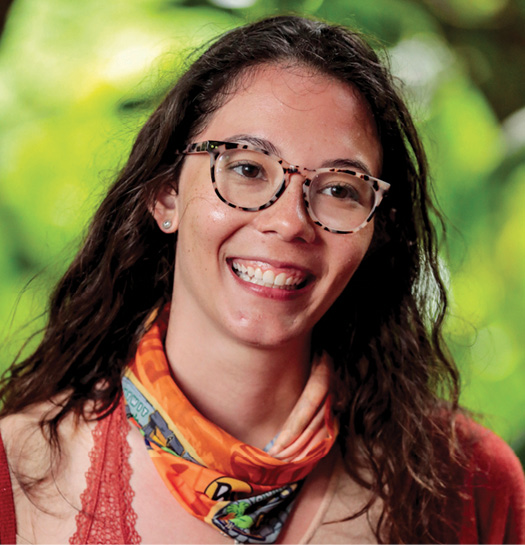
As technical writers, we have an arsenal of slingshots at our disposal. We’re adaptable, empathetic, systematic. We’re explorers, detectives, good communicators. In Survivor, a game about political and social maneuvering—where the key source of currency and power in the game is information—good communication skills are a must. Social relationships are the foundation of the game, and you can’t have relationships without communication. I felt confident in my communication abilities. But what I also experienced was that the communication issues and problems that face us in our everyday lives are placed under a giant microscope when you’re playing a game for a million dollars.
Let’s take a look at three challenges we face as technical writers and how those presented themselves to me on Survivor, and let’s discover how we can find our technical writing slingshot for each situation and use it to defeat that Goliath.
Advocating for Ourselves
As tech writers, we want to feel appreciated and know that our work matters. Sometimes it feels like a Goliath task to advocate for ourselves—what our job is, why we’re important, and how we add value to an organization. I was perhaps most excited to represent the field of technical communication, if only so that the eight million Survivor viewers across America would see the words “Technical Writer” on screen when I had a confessional (see Figure 3)!
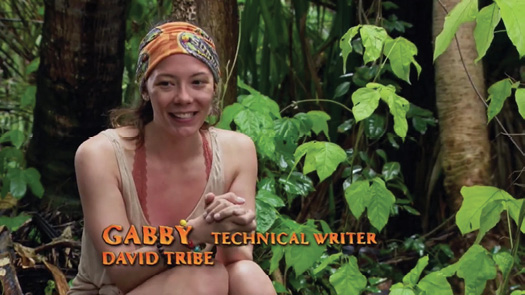
One of the biggest challenges I found when starting off my career in technical writing is explaining what my job is to those who are unfamiliar with the field. I found myself explaining what a technical writer was ad nauseum—during the casting process, in confessionals with the producers, and to my fellow tribemates.
On the first day of the game, we split into our tribe camps and began introducing ourselves to our new tribemates. We went around in a circle, saying our name and occupation.
The man before me introduced himself as a robotics engineer. Everyone was very impressed, including me. Then, it was my turn.
“My name is Gabby, and I’m a technical writer.”
I braced myself for the usual, “What does that mean?”
Instead, I saw a hand, extended in front of me. It was the robotics engineer. He shook my hand and said, “Thank you for your service.”
Not surprisingly, he ended up becoming my closest ally in the game. A subject matter expert who is appreciative of the work we do has a special place in my heart.
Just like I needed an ally on Survivor, we need allies in our jobs. Technical writers are skilled at making cross-discipline connections. Our slingshot is that we’re good at establishing relationships with the people that we need to: project managers, engineers, developers, marketing. Tech writers are some of the most well-connected people at an organization. The better we foster relationships with people, the more allies we have and the more we make ourselves and our worth known. We cannot do our job alone, but we’re just as important as an ally to others as they are to us. When we have good alliances, people recognize and appreciate the work that we do.
Synthesizing Information
What about when there’s a huge amount of information, and it’s your job to synthesize and process all of it to create something digestible? When we receive information from so many different sources, it can feel overwhelming figuring out where to begin.
Survivor was the perfect metaphor for this influx of information. You are learning as you go, based on day-to-day information you learn from your allies, your adversaries, and tribal council. There was no pre-written procedure for how to play the game.
If there was a step-by-step instruction guide on how to win Survivor, no one would watch the show. It would be the same show year after year. The joy of the game is that there’s not one way to win, not one set of foolproof directives that work every time. That is why the show has been on for 18 years—which always surprises people, whose first question to me is often, “That show’s still on?”
Instead, the information I had about Survivor was more like general concept material, or the general structure of the game: every three days or so, someone gets voted off the island. The goal of the game is simple: don’t get voted out. The steps to achieving that goal, however, you had to write yourself. The information you needed to reach that goal, you had to discover and make sense of on your own.
The technical writer’s slingshot is our ability to sift through a lot of information and figure out what’s important and what’s not. Our skillset is so much broader than just writing. We’re not just writers: we’re researchers, explorers, detectives. We gather data, and we decide what needs to be done with it. We’re analysts and learners, not only of technical information, but of human nature and psychology.
Overcoming Communication Obstacles
The last challenge is the culmination of the previous two: we’ve proven why our role is important, and we spent the effort processing the input. Now we need to navigate writing and communication obstacles and find a way to portray the information clearly to others. Just like I had to work with people from different walks of life on Survivor, as technical writers we have to communicate with all types of people, including non-technical people and people who aren’t writers themselves. And often on a deadline! Sometimes the Goliath task can be just doing the actual work!
My communication skills would be put to the test in one of the biggest challenges we played on Survivor. My tribemates were blindfolded and had to navigate me through an obstacle course (see Figure 4), and then I had to direct more blindfolded tribemates to guide a ball through a table maze (see Figure 5). Not only would the quality of my instructions matter, but also my ability to empathize with the people I was instructing. We always have to put ourselves in the shoes of our users, and in this case my users were people who couldn’t see where they were going. And of course, we were doing it all on a deadline—we had to beat the other teams.
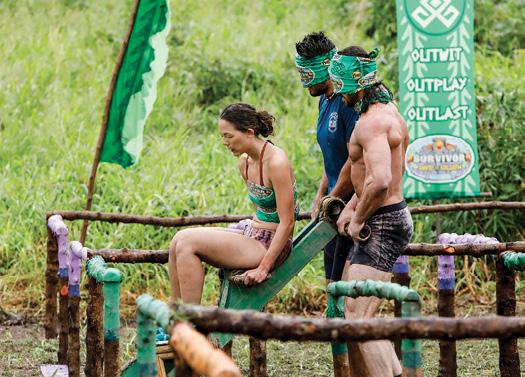
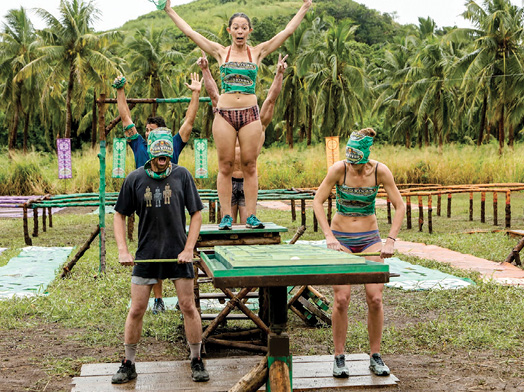
But if there’s any Goliath that tech writers are equipped to handle, it’s a communication challenge. In the game, this challenge was a do-or-die moment. We had just swapped to new tribes, and I was in the minority. If my tribe lost, I was getting voted out that night.
I guided my tribemates through the physical obstacles, just like I maneuver communication obstacles every day. I employed all my communication slingshots: empathy, precision, concision, patience, and persistence. And it paid off. My tribe came in first, winning ourselves immunity from being voted out, as well as a tray of cinnamon rolls and pastries—much needed sustenance after ten days of starvation. While I might have been, physically, the smallest and weakest on my tribe, that day my communication skills were the slingshot that led us to victory (see Figure 6)!
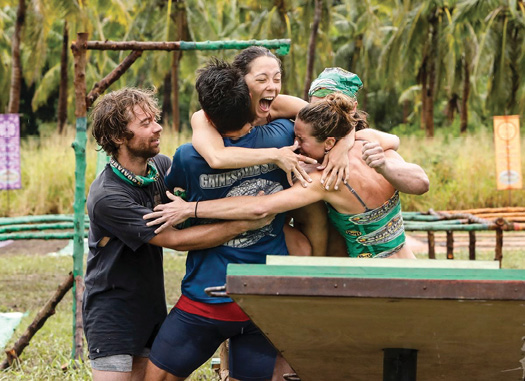
Yes, it helped to have two big, strong guys carrying me, but that’s like having a solid product to write about! The foundation and the bells and whistles are there, but it’s us, the communicators, who elevate and support the rest of the team’s efforts.
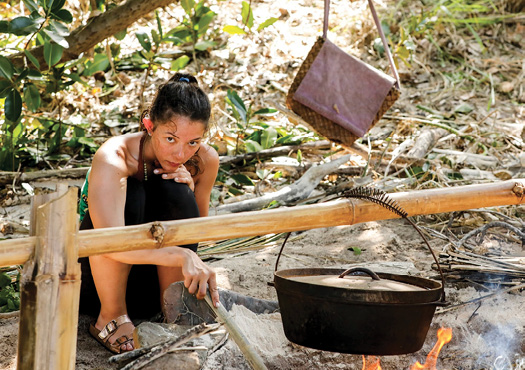

Finding Your Slingshot
The skills we have as technical writers help us in our jobs, in our day-to-day lives, and in situations you’d never expect … like trying to survive on a deserted island in a crazy game for a million dollars. As technical writers, we might often feel like we are David against Goliath, and others might view us as the underdog. But the thing about underdogs is this: we’re scrappy. We’re resourceful. We’re smart. We have a slew of hidden advantages. When we advocate for why our work is important, create allies along the way, and put on our detective hats, we can navigate any communication obstacle with ease. And good communication is a handy slingshot to have in any business, personal, or competitive context.
After surviving Survivor, I realized something: though others did underestimate me, the person most guilty of underestimating me was myself. I proved I have what it takes to make it: sleeping in the rain, not eating for days, clawing my way back from the bottom of a tribe. I was tougher than I ever knew, and I had only been doing myself a disservice by underestimating myself.
As technical writers, when we band together as a tribe, we help each other find our slingshots. We shouldn’t underestimate ourselves and neither should others, because maybe we are all a little more Goliath than we thought.
GABBY PASCUZZI (gspascuzzi@gmail.com) is a Technical Writer at Tenable, the cyber exposure company. She writes user documentation for Nessus, an industry-standard vulnerability assessment solution, and for Tenable.io, part of the Tenable Cyber Exposure Platform. She is passionate about writing with clarity, empathy, and cross-cultural sensitivity. In Fall 2018, Gabby was a contestant on CBS’s 37th season of Survivor: David vs. Goliath. As a communication specialist, Gabby savored the opportunity to maneuver the social and strategic mechanics of the game. She survived challenges both physical and mental; from a cyclone hitting the island to living with, and attempting to outlast, 19 people from different walks of life.


